
THE VOICE OF INTERNATIONAL LITHUANIA
|
VilNews has its own Google archive! Type a word in the above search box to find any article.
You can also follow us on Facebook. We have two different pages. Click to open and join.
|
News
![]()
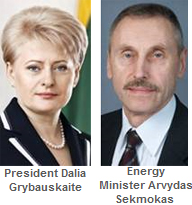
"The Government of Lithuania on Wednesday gave the projected liquefied natural gas (LNG) terminal in Klaipeda the status of national importance. The Cabinet approved the implementation plan of the LNG terminal project which provided for coordination and speedy work of all the institutions involved in the project.
It will force other departments to be more active in solving the issues related to land plots, EIA assessment and the involvement of the sea port in the project. The status stresses the importance of the project and obligates all the departments to accelerate it," Energy Minister Arvydas Sekmokas said after Government meeting Wednesday.
President Dalia Grybauskaite earlier criticised the slow pace of the LNG terminal project. "I positively view the president's urge to build the terminal as soon as possible," Prime Minister Andrius Kubilius said.
The prime minister noted that final decisions on the terminal building would be given after an environmental impact assessment. A working group has selected the southern water areas of the port of Klaipeda, near the Kiaules Nugara island, as a priority site for the terminal. According to the energy minister, the preliminary cost of the LNG terminal is about 200 million euros. It will be covered by the government, reports LETA/ELTA.
- Bookmark :
- Digg
- del.icio.us
- Stumbleupon
- Redit it
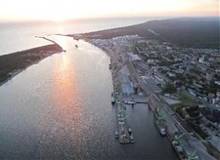
Klaipeda seaport authority received six tenders for an open procedure "Capital Dredging and Widening Works of Klaipeda State Seaport Navigation Channel", as the authority announced BC. The open procedure was announced on May 18, 2011. The tenders were submitted by foreign companies.
The project "Capital Dredging and Widening of Port Navigation Channel" is of vital importance to Klaipeda Port, as its representatives stated. In course of implementation of the project the width of the port will increase up to 150 meters from current 120 meters, and the depth relevantly will increase up to 14.5 meters as compared to present 13-13.5 meters.
Hence, the safety of gross tonnage vessel entering and leaving the Port and harbor manoeuvring will enhance in line with increased competitiveness of the port and its cargo handling capacity comparing to neighboring ports.
Such Port Navigation Channel parameters will result into favorable conditions to receive longer and wider postpanamax type vessels, the length of which reach up to 300-310 meters, and the width is nearly up to 40 meters.
Having signed the contract agreement on the capital dredging and widening of Klaipeda State Seaport navigation channel the winner of this open procedure shall execute all works within the period of 12 months (from the day of the contract – agreement has been concluded).
The intended volume of dredged soil in the I stage of works is 3 859 800 m3. The anticipated amount of excavated boulders in diameter from 0,8 to 1,5 metres is 440 units, the amount of boulders larger than 1,5 metres in diameter is 57 units.
The intended volume of dredged soil in the II stage of works is 655 200 m3 and the anticipated amount of excavated boulders in diameter from 0,8 to 1,5 metres is 50 units, the amount of boulders larger than 1,5 metres in diameter is 8 units.
The implementation of the project is envisaged in 2011-2012 using EU assistance funds (under the instrument No. VP2-5.2-SM-01 V of EU structural assistance priority 5 „Development of Trans – European Transport Network“).
Source: http://www.baltic-course.com
- Bookmark :
- Digg
- del.icio.us
- Stumbleupon
- Redit it
Fog rolls in on lighthouse
- Posted by - (0) Comment
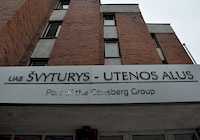
DARK DAYS: Svyturys brewery, in Klaipeda, faces labor strikes and a proposed marketing ban on alcohol.
KLAIPEDA - Lithuania’s market leading beer, Carlsberg Group-owned Svyturys Alus, or translated into English, ‘Lighthouse Beer,’ could be looking toward foggy futures ahead.
With company labor strikes in the pipeline for this month, set to disrupt production at their brewery in the city of Klaipeda, coupled with a proposed national alcohol advertising ban liable to come into force next year, the Danish-run brand has been on the front foot to come up with solutions.
A high percentage shift of the beer production, from Klaipeda to Utena, an industrial town in the northeast of the nation, second home to the joint manufacturer of the now named Svyturys-Utenos Alus, has allegedly left production volumes at Klaipeda’s brewery half that of three years prior. Disgruntled workers were questioning the reasons.
“As soon as the decision was made to transfer a part of production to Utena Brewery, the financial performance of the company deteriorated. An obvious tendency of the decrease in the company’s earnings, proportionate to the volume of the transferred production, can be observed,” claimed a spokesman on the European Commission sponsored Web site, beerworkers.org.
Read more at http://www.baltictimes.com/news/articles/29047/
- Bookmark :
- Digg
- del.icio.us
- Stumbleupon
- Redit it
Hitachi-GE wins Lithuanian nuclear tender
- Posted by - (0) Comment
![]()

Having been selected as 'strategic investor' for the Visaginas nuclear power project, Hitachi-GE is expected to build a nuclear power plant there for operation in 2020.
An announcement at the start of June revealed that Lithuanian officials had invited both Hitachi-GE and Westinghouse to submit proposals for Visaginas, which is to be a new power plant to replace generation lost with the shutdown of Ignalina.
After six weeks of consideration, the Ministry of Energy has today said that the evaluation commission has selected Hitachi-GE's proposal, based on the Advanced Boiling Water Reactor. Plans are for a single unit producing about 1300 MWe to begin operation from about 2020.
Partners in the project, Estonia, Latvia and Poland, participated in the evaluation, which encompassed a wide range of factors to determine which of the two proposals was the "most economically advantageous."
Some site preparation work has already taken place at Visaginas, and it already holds positive verdicts on environmental impact assessment and site suitability. The site is close by to Ignalina, where two large RBMK units built in the Soviet era provided some 2370 MWe, setting Lithuania's share of nuclear energy at 70% and giving healthy supply of power for export.
Visaginas is one of several active nuclear projects in the European Union. Single reactors are currently under construction in Finland and France, with more at the planning stage in each country. Two units are nearing completion in Slovakia, while plans for new build are maturing in the Czech Republic, Romania, the Netherlands and the UK.
Source: World Nuclear News
- Bookmark :
- Digg
- del.icio.us
- Stumbleupon
- Redit it
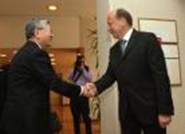
On 16 June a delegation led by Hitachi President Hiroaki Nakanishi introduced its bid to invest in Visaginas NPP project during a meeting with the Government of the Republic of Lithuania and the Commission for the Implementation of the New Visaginas NPP Project. Hitachi, together with one of its subsidiaries, Hitachi-GE Nuclear Energy.
“Our aim is to ensure that development of Visaginas NPP complies with all the international and nuclear safety requirements. Therefore we are delighted at this opportunity to welcome Hitachi, the top-level technology company, to Lithuania; this company has expressed its interest to participate in this project as a strategic investor”, said Prime Minister Andrius Kubilius.
Kubilius also noted that the fact, that it was President of Hitachi Group himself, who had introduced his company’s bid and showed his active involvement in the entire project environment, demonstrated very serious intentions by the potential investor, as well as recognition of Visaginas NPP project soundness.
“Lithuania would be interested in Hitachi’s investment not only into the nuclear power, but also in other sectors, especially high technologies, in our country”, said Kubilius after his meeting with the President of Hitachi.
During its visit in Lithuania, Hitachi delegation also met with representatives of the regional partners of Visaginas NPP project from Estonia, Latvia, and Poland, as well as the European Commission representatives.
The regional Visaginas NPP project is among the most progressive new nuclear power plant projects in Europe. Major part of the preliminary work for the project has already been completed, including the environmental impact assessment, which is in compliance with the ESPOO Convention, and the assessment of the site suitability; conclusions of both assessments were confirmed by expert missions from the International Atomic Energy Agency (IAEA) as well.
It is planed that construction work for Visaginas NPP will start in 2014, and the plant is to start generating power as of 2020.
- Bookmark :
- Digg
- del.icio.us
- Stumbleupon
- Redit it
Gazprom denies Lithuania ‘political’ price claims
- Posted by - (0) Comment

Gazprom spokesman
Sergei Kupriyanov
Russian giant Gazprom on Wednesday hit back at claims by Lithuania's president that the gas prices it applied for the Baltic state are were political and not based on economics.
"Lithuania's gas prices are not political," Gazprom spokesman Sergei Kupriyanov said in a statement released in the Lithuanian capital Vilnius.
"They are the result of a gas pricing formula which was agreed between our Lithuanian partners -- including the Lithuanian government -- and Gazprom back in 2004," he said.
On Tuesday, Lithuania's President Dalia Grybauskaite had fired a new shot in a verbal war between the nation of three million and Gazprom, its sole supplier, suggesting it was being treated unfairly.
"Gazprom's prices have a political character, not an economic one," Grybauskaite said.
"The difference in price for Lithuania and on global markets has a purely political tone," she added, blaming "the attitude of Russia's leaders towards cooperation with Lithuania."
In January Lithuania asked Brussels to probe Gazprom for allegedly abusing its market clout in the 27-nation European Union.
The price set in Gazprom's supply deal with Lithuania is confidential, but Grybauskaite has estimated that it pays 30-40 percent more than Germany, for example.
But Kupriyanov rejected the charges.
"The principle of this (gas-pricing) formula is by no means used only in Lithuania, but in all European countries," he said.
"The gas price in Europe can vary between different buyer countries and may change at different times within a signed contract," he explained.
"All of this is pure economics and has absolutely nothing to do with politics. Lithuania must be well aware of it," he added.
Lithuania's reliance on Russia for gas is a legacy of five decades of Soviet rule, which ended in 1991. Lithuania joined the EU in 2004.
Read more at:
http://www.google.com/hostednews/afp/article/ALeqM5haAHGhobpcNwnqavK3bFAv9cnn9g?docId=CNG.672921cf040c5c718fe8bdbe7ea930e8.1b1
- Bookmark :
- Digg
- del.icio.us
- Stumbleupon
- Redit it
Today’s news from:
- Posted by - (0) Comment

Implications of Lithuania's Unbundling of Gazprom-Controlled Pipelines
July 7, 2011
Lithuania has become the first EU country to start implementing the EU's Third Package of energy market liberalization laws. Estonia is considering a move in the same direction, possibly by October. Meanwhile, Latvia has...
Lithuania Decides to Unbundle Pipelines From Gazprom's Control
July 7, 2011
On June 30, the Lithuanian parliament adopted legislation barring the supplier of natural gas (in this case, Gazprom) from owning or operating pipelines in the country. This conforms with the European Union's Third Package of...
Lithuania Enlists US Companies for Gas Supply and Transportation Projects
July 5, 2011
Attending the Lithuanian-chaired, Community of Democracies annual event in Vilnius on July 1, US Secretary of State Hillary Clinton endorsed Lithuania's energy security strategy on its three levels: the national, regional, and...
- Bookmark :
- Digg
- del.icio.us
- Stumbleupon
- Redit it
Irishman on trial accused of Lithuania arms deal on behalf of the Real IRA
- Posted by - (0) Comment
![]()

Michael Campbell (38)
Photo: REUTERS
Lithuanian prosecutors last Friday asked for 16-year prison sentence for an Irish citizen accused of trying to buy weapons for the Irish terrorist group.
Michael Campbell (38) was arrested in January 2008 in an international sting operation, and is accused of trying to buy guns and explosives for the Real IRA from undercover agents.
While the proposed sentence was revealed on Friday, Campbell's legal team will only present his final defence at hearings in the middle of September.
Lithuania's overloaded courts usually postpone hearings until the autumn because of their summer recess.
In the last hearing in May, Campbell told the court in the Lithuanian capital that he was set up by British intelligence and denied he plotted to boost the arsenal of the Real Irish Republican Army, led by his elder brother.
His trial opened in August 2009. Open hearings have been rare due to a blackout when Lithuanian and British intelligence witnesses testified.
Campbell's family ties are crucial to the prosecution case because his brother Liam, 47, is one of the four leaders of the Real IRA found liable by a civil court for a 1998 bombing in Omagh, Northern Ireland, which killed 29 people.
The Real IRA broke with the Provisional IRA - once the main armed group opposed to British rule in Northern Ireland - in 1997 over the latter's support for a peace deal with London.
- Bookmark :
- Digg
- del.icio.us
- Stumbleupon
- Redit it
Travel magazine elects Vilnius Old Town among “66 Beautiful Small Cities & Towns In Europe”
- Posted by - (9) Comment
![]() The online travel magazine ‘Flexijourney’ has picked their favourite small cities and towns in Europe, and Vilnius Old Town is one of them!
The online travel magazine ‘Flexijourney’ has picked their favourite small cities and towns in Europe, and Vilnius Old Town is one of them!
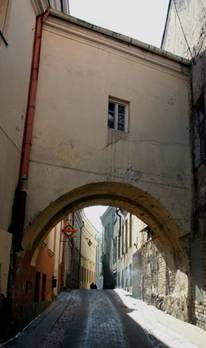
Here is what they write:
The Old Town of Vilnius (Lithuanian: Vilniaus senamiestis), one of the largest surviving medieval old towns in Northern Europe, has an area of 3.59 square kilometres (887 acres). It encompasses 74 quarters, with 70 streets and lanes numbering 1487 buildings with a total floor area of 1,497,000 square meters. The oldest part of the Lithuanian capital of Vilnius, it has developed over the course of many centuries, and has been shaped by the city's history and a constantly changing cultural influence. It is a place where some of Europe's greatest architectural styles – gothic, renaissance, baroque and neoclassical – stand side by side and complement each other. Pilies Street is the Old Town's main artery and the hub of cafe and street market life. The main street of Vilnius, Gediminas Avenue, is partially located in the Old Town
Read the article at:
http://www.flexijourney.com/blog/66-beautiful-small-cities-towns-in-europe/
- Bookmark :
- Digg
- del.icio.us
- Stumbleupon
- Redit it
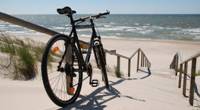
'Lithuania is yet to really take off with British visitors, which is all the more reason to head there,' says the newspaper...
'The country's big summer resort is Palanga - a fantastic 10km stretch of beach set against pine trees and sand dunes [which] remains a hotspot for the country's young and beautiful, well justifying its reputation as Lithuania's party capital.'
- Bookmark :
- Digg
- del.icio.us
- Stumbleupon
- Redit it

IRVING, Texas, Jul 05, 2011 (BUSINESS WIRE) -- Fluor Corporation announced today that it has been awarded a contract by Klaipedos Nafta AB, Lithuania's state-owned oil company, to provide engineering and business support services for a new floating liquefied natural gas (LNG) import terminal in Klaipeda, Lithuania. Fluor booked the undisclosed contract value in the second quarter of 2011.
Under the contract, Fluor will provide Klaipedos Nafta with engineering, technical, risk management, safety and environmental advisory services. As the lead advisor, Fluor will prepare the technical development plan and assist in selecting technologies, as well as developing a business plan for the terminal.
"Fluor is pleased to serve as an advisor to Klaipedos Nafta's development phase for a new LNG terminal in Klaipeda," said Peter Oosterveer, president of Fluor's Energy & Chemicals Group. "This is another sign of growth in the LNG market and the growing importance of that development in the Baltic region."
"We selected Fluor as the lead advisor due to their having the best experience, optimal work execution and price, and we are pleased with the fact that negotiations were completed successfully and in a timely manner," said Rokas Masiulis, general manager of SC Klaipedos Nafta.
Fluor has previous experience in Lithuania as the engineering, procurement and construction contractor for the Butinge Oil Terminal Project for Mazeikui Nafta in Butinge, Lithuania, in 1999. In the early 1990s, Fluor conducted a feasibility study and developed siting plans for Lithuania's Energy Ministry for the expansion of its Klaipeda oil terminal.
Klaipedos Nafta operates the oil terminal in the city of Klaipeda, which is located on a Baltic Sea port and is part of a key shipping route for Eastern Europe.
About Klaipedos Nafta

Klaipedos Nafta owns and operates one of the most modern crude oil and crude oil products terminals in Europe. It operates in the ice-free port of Klaipeda, a major Lithuanian transport junction connecting sea routes, motorways and railways between the East and West. Klaipedos Nafta is currently in the process of building the first LNG import terminal on the Eastern Baltic Sea shore with an initial LNG import capacity between 2.2 to 3 billion m3. For more information, visit www.oil.lt
About Fluor Corporation

Fluor Corporation designs, builds and maintains many of the world's most challenging and complex projects. Through its global network of offices on six continents, the company provides comprehensive capabilities and world-class expertise in the fields of engineering, procurement, construction, commissioning, operations, maintenance and project management. Headquartered in Irving, Texas, Fluor is a FORTUNE 200 company and had revenue of $20.8 billion in 2010. For more information, visit www.fluor.com .
SOURCE: Fluor Corporation
PRESS RELEASE FROM:
http://www.businesswire.com
- Bookmark :
- Digg
- del.icio.us
- Stumbleupon
- Redit it

Estonian national carrier announced yesterday that it had decided to close its hub in Vilnius in September and bring its Vilnius-based Boeing 737-500 back to Tallinn.
“We are satisfied with the amount of passengers in Vilnius airport where we achieved more than a 10% market share. Despite high interest, both Vilnius routes are due to significantly increased fuel cost currently losing money, which we cannot accept. 1.5 years ago Lithuania’s aviation market was in a recession - it was wise to enter in a low competitive market, but as for today the competition in Vilnius airport has grown. Considering that the demand in Estonia has increased, it is unnecessary to keep the airplane in Vilnius,” said Rauno Parras, Vice President Commercial of Estonian Air.
The fleet of Estonian Air consists of eight aircraft: two Boeing 737-500, two Boeing 737-300 and two CRJ900 NextGen. Two Saab 340 type airplanes are operated by Estonian Air Regional.
- Bookmark :
- Digg
- del.icio.us
- Stumbleupon
- Redit it
Lithuania’s impressive recovery
- Posted by - (1) Comment
![]()

By Violeta Klyviene - Danske Bank A/S
In the following, we present an updated outlook for the Lithuanian economy, given the latest economic releases for May and June.
In the first quarter of this year, Lithuania demonstrated an impressive recovery: GDP growth accelerated to 6.9% y/y in Q1 11, up from 4.8% y/y in Q4 10. In Q4, the Lithuanian economy was supported by a more notable recovery in domestic demand: final consumption expenditure grew by 4.5% y/y and fixed investment by 41% y/y. The recovery in private consumption is likely to accelerate this year, basically due to a relatively favourable fiscal policy stance. We now expect the Lithuanian economy to grow by 5.8% y/y in 2011E and 4.9% in 2012E.
Lithuanian CPI inflation continued to accelerate, mainly due to a rise in food prices. So far, we see no strong inflationary pressure from the domestic demand side. However, private consumption is growing faster than we predicted and there is a risk that domestic pressure on core inflation could intensify over the second half of this year. We now expect Lithuanian average inflation of 4.7% y/y for 2011 and 3.6% y/y in 2011.
The current account remains in small surplus in 2011, but over the medium term it would swing into a deficit as the trade balance deteriorates further. We forecast that the deficit will remain at a manageable level, but such a trend indicates that competitiveness issues remain relevant.
- Bookmark :
- Digg
- del.icio.us
- Stumbleupon
- Redit it
- Posted by - (0) Comment
The Travel Magazine:
Spa, romance in the Uzupis and beer. Vilnius makes for a great weekend away
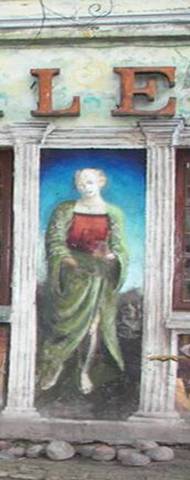
The UMI gallery in
UŽ!upio resPUBLIKA
Photo: Rasa Mekuskaite
If you believed the hype about amber you’d think it was the cure for all ills: heart problems, arthritis, depression, even the plague. I can’t vouch for any of those but I can say that having one’s face massaged with amber powder applied by amber balls is an absolutely delicious experience, like some rather superior form of tickling.
The ‘Gold of the North’ has been fished out of the Baltic Sea and traded for centuries – it was much in demand in Imperial Rome – and here today in Vilnius it is still big business.
There are countless shops, a museum devoted to the subject and a specialist spa which is where I’m about to sample a treatment.
I confess to being a bit of a fidget in some spas and when linen bags are tied round our bare feet and we’re asked to walk in different ways across a layer of small pieces of the fossilised resin – on our toes, on our heels, feet rolled outwards, feet rolled inwards – the familiar combination of mild irritation and self-consciousness begins to creep over me.
But once I’m lying on a bed and the therapist is gently rolling the amber spheres over my skin, pressing here and there, I succumb to the pleasure of the moment. I don’t know whether the ‘negative ions’ or whatever have done their bit: I can’t say I look any different by the end of the session but I certainly feel very contented and serene. And my purse is only lighter by about £15 which is certainly a lot cheaper than buying a piece of jewellery.
There are more elaborate treatments but the 20 minute one I’ve had is just right when time is limited.
We’re only in the Lithuanian capital for two days but because it’s relatively small and compact – certainly in the historic areas – you can fit a lot in. The old city is the major draw, with 1500 buildings one of the finest in Central and Eastern Europe, an UNESCO World Heritage Site of narrow streets, hidden courtyards and an extraordinary mix of architectural styles: classical, gothic, baroque.
Read more at: http://www.thetravelmagazine.net
USEFUL INFO
www.lithuaniatourism.co.uk
www.vilnius-tourism.lt
www.lokys.lt
www.vilniuscitytour.com
www.ambermassage.lt
www.kybynlar.lt
We stayed at www.novotel.com
We flew to Vilnius with Wizzair from Luton (they also fly to Vilnius from Doncaster/Sheffield). Prices from around £42 one way. Find cheap flights to Vilniusfrom other airports.
- Bookmark :
- Digg
- del.icio.us
- Stumbleupon
- Redit it
![]()
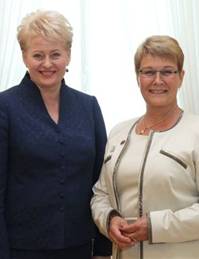
President Dalia Grybauskaitė and Swedish Minister for Enterprise and Energy, Maud Olofsson
President Dalia Grybauskaitė this week had a meeting with Swedish Minister for Enterprise and Energy, Maud Olofsson.
Issues discussed at the bilateral meeting included energy security, building of the NordBalt power bridge between Lithuanian and Sweden, construction of a LNG terminal in Lithuania, and opportunities for closer cooperation within the NB8 framework.
The President and the Swedish Minister agreed to intensify cooperation towards timely implementation of all EU decisions related to energy security and towards securing proper financing for vital projects.
"The power bridge to Sweden will integrate Baltic electricity networks into the Nordic power market and will ensure our country's and region's energy independence and security. It will also contribute to the establishment of the EU internal market without ‘energy islands', which makes Lithuania's energy projects significant for the whole Europe," the President said.
The President thanked Sweden for its continuous support for Lithuania in its efforts to ensure energy independence, and the Swedish Minister promised further support for Lithuania on issues of highest concern: safety of nuclear power plants underway in the Lithuanian neighborhood and swift implementation of electricity and gas connections to Poland.
- Bookmark :
- Digg
- del.icio.us
- Stumbleupon
- Redit it
![]()
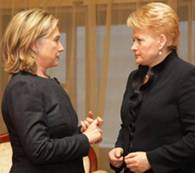
U.S. Secretary of State, Hillary Clinton, and Lithuanian President Dalia Grybauskaite
U.S. Secretary of State Hillary Clinton is in Vilnius, on a two-day visit from 30 June to 1 July, to participate in the Community of Democracies 6th Ministerial. The Ministerial will bring together senior government officials, parliamentarians, NGOs, women and youth leaders, and the private sector to advance the shared goals of strengthening civil society and supporting emerging democracies. During her visit, the Secretary will participate in the "Women Enhancing Democracy" gathering of world leaders, held under the auspices of the Community of Democracies’ working group on women’s empowerment. She will also host a session of the Strategic Dialogue with Civil Society focused on challenges to the freedoms of speech and association. While in Vilnius, the Secretary will hold bilateral meetings with President Grybauskaite, Prime Minister Kubilius, and other Lithuanian officials.
- Bookmark :
- Digg
- del.icio.us
- Stumbleupon
- Redit it
VilNews e-magazine is published in Vilnius, Lithuania. Editor-in-Chief: Mr. Aage Myhre. Inquires to the editors: editor@VilNews.com.
Code of Ethics: See Section 2 – about VilNews. VilNews is not responsible for content on external links/web pages.
HOW TO ADVERTISE IN VILNEWS.
All content is copyrighted © 2011. UAB ‘VilNews’.

 Click on the buttons to open and read each of VilNews' 18 sub-sections
Click on the buttons to open and read each of VilNews' 18 sub-sections 















.jpg)



